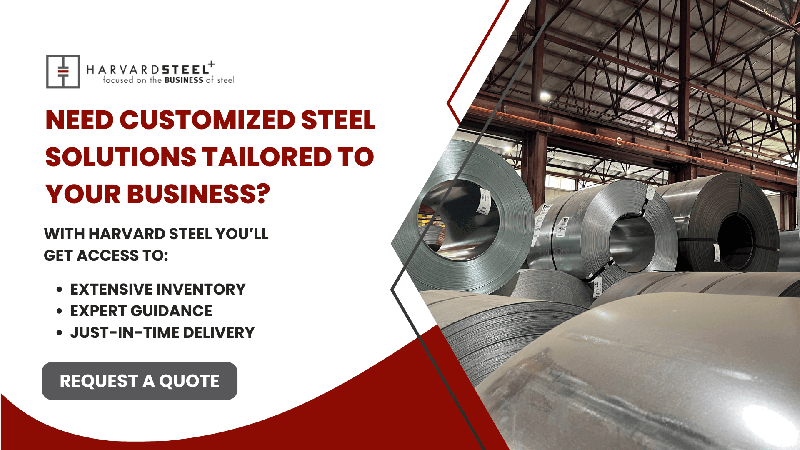Navigating the steel processing industry can be like walking through a maze, especially when choosing the right service center. You have family-owned steel centers, on one side and corporate steel providers on the other. Both have their strengths and weaknesses and understanding these can make a world of difference. Let's dive into what sets them apart and how each can serve your needs now and in the future.
Building Relationships: The Personal Touch
Family-Owned Steel Service Centers: Personalized Attention
One of the standout benefits of working with a family-owned service center is the personalized customer service. Here, you're not just another name in the system. You often get direct access to business owners or senior managers, fostering a more personal and responsive relationship. This can be a game-changer for anyone who values one-on-one interactions.
Corporate Steel Service Providers: Structured Interaction
In contrast, corporate steel providers have more formal processes with multiple contact points. This setup ensures standardized service but can sometimes lead to longer response times and less personalized interaction. While efficient, it may lack the personal touch that family-owned centers offer.
Flexibility and Agility: Quick on Their Feet
Family-Owned Steel Service Centers: Nimble and Responsive
Family-owned service centers are incredibly flexible and agile. They can adjust production schedules on the fly and hold inventory without specific orders. This means they can respond rapidly to customer needs, providing just-in-time delivery and expediting orders as necessary.
Corporate Steel Service Providers: Structured but Less Flexible
While efficiently handling large volumes, corporate steel providers often struggle with flexibility. Their operations are tightly controlled, with inventory usually pre-sold. This can lead to longer lead times for new or unexpected orders, making it harder to accommodate urgent requests.
Product Range and Inventory: Diverse vs. Specialized
Family-Owned Steel Service Centers: Broad Inventory
Family-owned centers maintain a diverse inventory, offering both prime and non-prime steel across various grades and products. This allows them to meet varied customer demands and cater to niche markets. Their ability to hold unsold inventory means they can often fulfill orders quickly and efficiently.
 Family-owned steel service center warehouse with master coils ready for processing.
Family-owned steel service center warehouse with master coils ready for processing.
Corporate Steel Service Providers: Focused Inventory
Corporate steel providers typically focus on prime steel products, with much of their inventory allocated to specific customers. While they handle large-scale orders effectively, their ability to cater to diverse or last-minute needs can be limited. Their reliance on pre-sold inventory can sometimes hinder responsiveness to market changes and customer emergencies.
Technology and Efficiency: Staying Competitive
Family-Owned Steel Service Centers: Leveraging Technology
Family-owned centers use technology to enhance their service offerings. For instance, their wide gauge range on slitters allows for diverse processing options. They also employ just-in-time delivery systems to meet customer demands promptly, keeping them competitive despite their size.
 Master steel sheet coil being processed to customer specifications using a slitter
Master steel sheet coil being processed to customer specifications using a slitter
Corporate Steel Service Providers: Advanced Infrastructure
Corporate steel providers benefit from economies of scale and advanced technological infrastructure. They have sophisticated logistics systems, automated processes, and extensive innovation resources. These capabilities boost operational efficiency but can also introduce challenges in maintaining flexibility.
Competing on Different Fronts
Niche Market Expertise
Family-owned centers excel in serving niche markets due to their flexible inventory management and personalized service. They provide tailored guidance and support to clients entering new markets or requiring specialized products, building strong relationships and loyalty.
Scale and Resources of Corporate Providers
Corporate steel providers leverage their scale to handle significant volumes and offer competitive pricing. Their extensive resources and multiple locations enable them to service large industrial clients with complex needs. However, their focus on large-scale operations can limit their ability to offer personalized service.
Facing Challenges Head-On
Family-Owned Steel Service Centers: Overcoming Hurdles
Family-owned centers face competition from the logistical advantages and brand recognition of larger competitors. However, their flexibility, diverse inventory, and personalized service help them earn the trust and business of manufacturers. Big or small, they serve them all. They adapt quickly to technological advancements and changing customer needs, maintaining their edge in the market.
Corporate Steel Service Providers: Balancing Efficiency and Personalization
Corporate providers balance efficiency with the need for personalized service. Their structured processes and reliance on pre-sold inventory can slow their response times. However, their scale and resources allow them to handle large orders effectively.
Looking Ahead: Trends and Adaptations
Industry Consolidation
The steel service industry is seeing more consolidation, with corporations acquiring family-owned centers. This trend presents challenges and opportunities. Family-owned centers may find it challenging to compete on scale but can differentiate through personalized service, competitive pricing, and flexibility.
Adapting to Change
Both family-owned and corporate steel processing centers must adapt to technological advancements, sustainability concerns, and evolving customer needs. Family-owned centers can quickly adopt new technologies, while corporations may invest in extensive research and development to stay ahead of industry trends.
Conclusion: Making the Right Choice
Choosing between family-owned and corporate steel service centers depends on your specific needs. Family-owned centers exemplify the benefits of personalized service, flexibility, and a diverse inventory. Meanwhile, corporate providers offer scale, efficiency, and extensive resources. Understanding these differences helps you make an informed decision, ensuring you receive the best possible service and value.

.png?width=290&name=image001%20(5).png)


COMMENTS